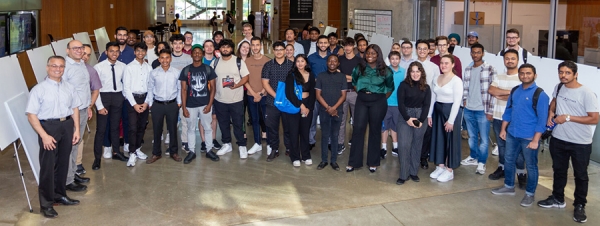 Predictive ecologist Christina Semeniuk has been elected to the Royal Society of Canada’s College of New Scholars, Artists, and Scientists.
Predictive ecologist Christina Semeniuk has been elected to the Royal Society of Canada’s College of New Scholars, Artists, and Scientists.
The Royal Society of Canada has elected Christina Semeniuk, an associate professor in the Department of Integrative Biology, to its College of New Scholars, Artists, and Scientists in recognition of her scholarly achievements.
Dr. Semeniuk, a Faculty of Science Research Chair, is cross-appointed to the Great Lakes Institute for Environmental Research and director of the Fisheries management and conservation Careers in Science and Technology (FishCAST) program. Funded by the Natural Sciences and Engineering Research Council of Canada’s (NSERC) Collaborative Research and Training Experience Program (CREATE), it trains graduate students across multiple Canadian universities in the fisheries and aquatic sciences.
Founded in 1882, the Royal Society of Canada recognizes excellence, advises the government and the larger society, and promotes a culture of knowledge and innovation in Canada and with other national academies around the world. Its college is intended to provide multigenerational capacity to help Canada and the world address major challenges and seize new opportunities.
In announcing Semeniuk’s election, the society called her an internationally recognized predictive ecologist and continued: “Her pioneering contributions are developing leading-edge interdisciplinary solutions for conservation science within coupled human-and-animal systems in conflict over resources. She embraces social justice and EDI measures to innovate responsible scientific and knowledge exchange to ensure successful conservation for all.”
Shanthi Johnson, UWindsor vice-president, research and innovation, welcomed the honour.
“I am absolutely delighted that the Royal Society of Canada is recognizing Christina Semeniuk’s stellar contributions and impact on her field by electing her to the college,” Dr. Johnson said. “College membership is among the most prestigious honours bestowed on Canadian academics in the earlier stages of their careers.”
Royal Society of Canada president Alain-G. Gagnon said the class of 2023 have been recognized by their peers for exceptional contributions to the world of science and culture.
“The impact of their work will continue to be felt in the development of public policies for years to come, while adding greatly to the enrichment of public life,” he said.
Semeniuk and other new members of the college will be formally inducted in a ceremony Nov. 16 in Waterloo.


